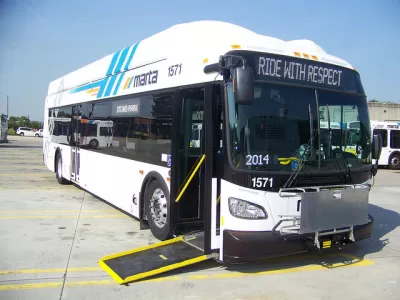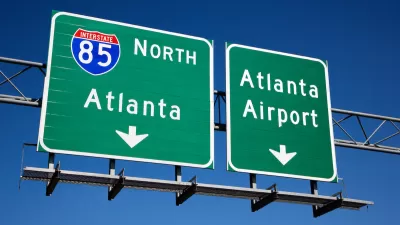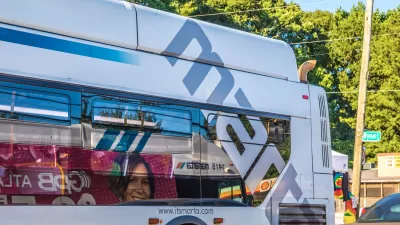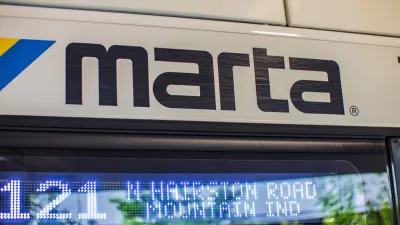The group expressed concerns with changes made to a key segment, which leaves riders with fewer connections to existing transit and does not position the line for future growth.

In an open letter to the city, the Atlanta Downtown Neighborhood Association (ADNA) is calling for a change in approach to Atlanta's first Bus Rapid Transit (BRT) line to prevent wasteful spending. "The ADNA’s preferred route would more swiftly move passengers around the city, connect to existing MARTA rail, and position the BRT system for future growth, they feel."
The letter, published in Urbanize Atlanta, claims that the "Locally Preferred Alternative" route proposed for a section of the BRT line downtown is not what locals want. "Crucially, this new route has three large sections in downtown where it will have to operate in 'shared' traffic lanes in contradiction of BRT standards, slowing service and reducing ridership during peak times" and makes no accommodations for future expansion.
The Association argues that "[w]hen this change to the route’s downtown section was made in 2019, little outreach was done to key stakeholders, such as the Atlanta Downtown Neighborhood Association (ADNA) and the approximately 14,500 (and rapidly growing) downtown residents most directly impacted." The letter also claims that residents were misled about the new route, which "dumps riders in the middle of South Downtown without direct connection to any current or planned rail."
"This current 'western' BRT route also jeopardizes existing plans to bring cycle tracks, wider sidewalks, and outdoor dining to downtown streets as well as upending partially funded plans to restore two-way traffic flow planned along these corridors." With 60 percent of the design completed to date, the letter urges the city "to get this done right and avoid wasting money later in the process."
FULL STORY: Downtown Atlanta neighbors plead to city: 'Save MARTA bus rapid transit'

Maui's Vacation Rental Debate Turns Ugly
Verbal attacks, misinformation campaigns and fistfights plague a high-stakes debate to convert thousands of vacation rentals into long-term housing.

Planetizen Federal Action Tracker
A weekly monitor of how Trump’s orders and actions are impacting planners and planning in America.

San Francisco Suspends Traffic Calming Amidst Record Deaths
Citing “a challenging fiscal landscape,” the city will cease the program on the heels of 42 traffic deaths, including 24 pedestrians.

Adaptive Reuse Will Create Housing in a Suburban Texas Strip Mall
A developer is reimagining a strip mall property as a mixed-use complex with housing and retail.

Study: Anti-Homelessness Laws Don’t Work
Research shows that punitive measures that criminalized unhoused people don’t help reduce homelessness.

In U.S., Urban Gondolas Face Uphill Battle
Cities in Latin America and Europe have embraced aerial transitways — AKA gondolas — as sustainable, convenient urban transport, especially in tricky geographies. American cities have yet to catch up.
Urban Design for Planners 1: Software Tools
This six-course series explores essential urban design concepts using open source software and equips planners with the tools they need to participate fully in the urban design process.
Planning for Universal Design
Learn the tools for implementing Universal Design in planning regulations.
Heyer Gruel & Associates PA
JM Goldson LLC
Custer County Colorado
City of Camden Redevelopment Agency
City of Astoria
Transportation Research & Education Center (TREC) at Portland State University
Jefferson Parish Government
Camden Redevelopment Agency
City of Claremont





























